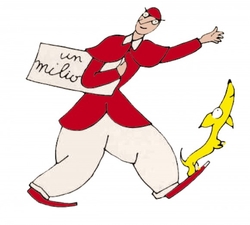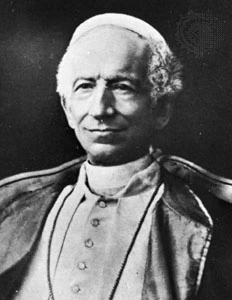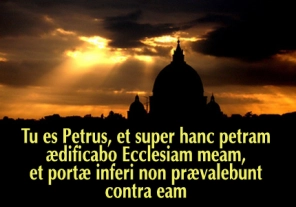Daily Archives: November 21, 2022
Reverence, Expanded

My post of last week about reverence has caused many reactions, which showed me that the issue is more pressing than your average Novus Ordo, V II, “let’s have an applause for Mrs Jenkins, who always greets everyone at the entrance”-priest would like to admit.
However, reader Michael Warning pointed out to something that, I think, needs reflection: there are Latin Masses that are disrupted, too.
I only ever experienced one of these masses. I did not find it as disrupted as your typical NO mass (by far not), but certainly, it was more disrupted than I expected it to be.
I noticed this and could only – sadly – reflect on this: that you can’t bring Sodom out of Lot. Unless there is a work of education of the faithful on the deep meaning of reverence at Mass, and on the fact that a disruption is still a disruption even if it is caused by a child, chances are that, among the young couples attending to a Latin Mass, there will be those who still struggle to grasp that “reverence” thing, and have no cultural instruments to understand that, in the end….
no, it is not OK.
It has been, in saner times, a constant praxis of the Church that children should only be in church when they can behave and cause no disruption (this will, of course, depend from the degree of maturity and self-control of the single child). Also, it has been a constant praxis of the Church that, if there is no possibility to leave a child at home when attending mass, there is no mass obligation for the person who minds the child.
So, if papa and mama want to attend the Latin (and not only Latin) Mass but have a small, noisy toddler, or a baby, and there is no reasonable way to park the child by grandma on a Sunday morning, the mother can and should well stay home with the child until such time as the child can attend mass without disruption (perhaps, at times, papa could stay, though I wonder how many Italian mamas would like the arrangement…).
How do I know all this, you will ask?
As to the second statement, I have it from a homily at a Latin Mass.
As to the first statement, I have it from frequent, lived, personal experience. In fact, I distinctly remember the many times in which my art-loving, but not churchgoing parents would not allow me to enter a church they were visiting (papa would go first, then he would get out and it would be mama’s turn), explaining it with the fact that I, a mere child, was not disciplined enough to enter the church. Later, when I was old enough to be allowed to enter, I was still forbidden to do so in days in which I was restless or noisy. This was because, even for my agnostic father, it was not OK that it would enter the sacred space of a church and even only cause a risk that the place, – mind, ***outside of mass*** -, be sullied by my unruly behaviour.
I also happen to remember ( I remember a lot of things of my early childhood; then I struggle to remember what I ate for breakfast…) that no one of my cousins was allowed to enter church, either; the village church of our early childhood being, for us, an inaccessible, magical place full of mystery and, in fact, tremendously awe-inspiring (and note here, my aunt and uncle did go to Mass!).
These things did not happen out of my father’s strange idea about reverence and, again, my father was agnostic and not at all church going. This can only have happened because of a concept of reverence that was deeply embedded in the Italy my parents grew in, something that was cultural before even being specifically religious. Today’s behaviour is what 50 years of happy clapping, guitars in church and aggiornamento do to people.
Mind, there were certainly exceptions and, perhaps, different regional sensitivities (in one of the Don Camillo movies, you can hear a baby crying during the homily; perhaps it was done for effect…); you can also say that I was raised strictly, and so were my cousins, and you would certainly be right; but yes, reverence was a big thing, no doubt about it.
When sanity comes back, the return to proper liturgy will have to be accompanied by a work of reeducation of the faithful; reeducation to, well, sanity, then it is a mystery to me how people can even chit chat in church before the mass starts. The naturally reverent Latin Mass will help a lot; but, on its own, it will not do the trick, because what is going lost is the sensus catholicus and the deep reverence that contributed to the Latin Mass in the first place.
Helping me To Find That Book: Full Success By Half!

After I wrote this post, I had many answers, showing the great quality of the readers of this little effort.
One of the answers had (with huge hat tip to reader Quoter Meister!) what it seemed to me the winning take: Thomas Aquinas’ Compendium of Theology.
This book had two characteristics of the book I was looking for and that I remembered (or seemed to remember):
- Written by St Thomas Aquinas, and
- Structured as “steps” building one on another.
Full of enthusiasm, I started reading the book (there is a link to an electronic version in the comments to the other post).
The book is excellent, and I recommend to everyone with an interest in theology to give it a try. It can be read in sections, which further enhances the possibility of a reader to get from it the required information or to digest it in more manageable logical chunks. The book also shows, though there is no need for that, the utter superiority of old, thinking people to what passes for intellectuals today.
However, the book is not exactly what I was looking for, or better said: it is not exactly the book I was trying to find.
This is a theological treatise starting with a treatise on Faith and, specifically, God. It is, therefore, a theological work from the get go.
The book I remember reading had two differences with this one.
- The “steps” were much shorter than in this book. They were so short that you would devour the first ones, same as you might get a flight a small steps running (before, slowly, the going gets harder). Also, every step had only one logical advancement, explained once (this one often has three or more explanation of the step, from very early on).
- The steps started not from God, but from the observation of reality. It was a theology work built on philosophy. It was a book which (as far as my memory can assist me) set up to explain reality, and God’s place in it, starting (in pure Aristotelean fashion) from the observation of reality itself and building from there.
Therefore, what I would say is that the Compendium of Theology does exactly what I remember the other book doing, but not in exactly the same way I remember the other book doing it. Of course, you can say that my brain has a certain age by now, and I would agree with you. It can also be that the other work I read was a manipulation or extrapolation of Thomistic thinking, perhaps from more than one source. But it was not quite the Compendium of Theology.
I might, or not, manage to find the book again.
Still, the search already brought me to what is clearly an accessible masterwork of theology, for which I am grateful to all the readers who have helped me in this quest, particularly Quoter Meister.




















You must be logged in to post a comment.